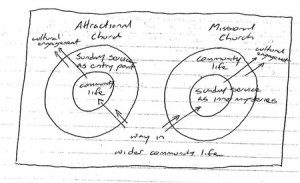Andrew Jones shared a recent e-mail conversation with pastor, author and speaker Brian McLaren on his blog about his latest book, Everything Must Change.
Great questions from Jones I thought (several occurred to me and several that didn’t – I think I just remained optimistic when something wasn’t directly addressed, it wasn’t because it was purposely left out because McLaren didn’t agree, but more because he wasn’t the focus of the book) and great answers from McLaren I thought.
You can read the whole conversation on Jones’ blog, but of course I’ll share a few highlights:
McLaren: One of the things that I hope the book does (by understatement, perhaps?) is help people think of “church” in broader ways. For example, I don’t think that the church per se is going to intentionally solve economic problems in Africa. But churches will inspire entrepreneurs and activists and politicians and health care workers and community organizers and film-makers, etc., to work together in ways that will bring more and more healing. In this way, “church work” is building up the church, but “the work of the church” is doing kingdom work in our daily lives and jobs, from business to art to government to education to agriculture to whatever.
Jones: 2. The apparent absence of HOPE in your view of future things. Maybe i missed it but you don’t seem to acknowledge hope in the afterlife, resurrection of the dead, etc in your book and i had to guess whether you had walked away from these foundational orthodox doctrines or you were focusing exclusively on the immanence of the gospel in today’s world for effect.
McLaren: Again, I set a pretty specific goal for myself in this book: to explore global crises and what the message of Jesus says to those crises. I did address life after death in Secret Message of Jesus, chapter 20. So I haven’t walked away from hope in the afterlife, etc. If anything, I see more than ever how hope in the afterlife is necessary to keep us going when progress in this life seems slow or nonexistent.
Jones: Brian, your view on the last things has a few of us guessing. How does your eschatological position compare with . . say . . an evangelical post-millenial view? And do you believe in life after death?
McLaren: Just to be super clear … YES! I believe in life after death! I find it hard to line up my views with conventional pre, post, or amillenial views because I think they are all based on an assumption I don’t share, i.e. that the book of Revelation is intended to tell us how the world will end. This view presupposes a deterministic view of history, which I don’t share. I suppose I’m more Wesleyan and Anabaptist in this regard than Calvinist. Anyway, I talk about this in detail in SMJ, and refer to it briefly in EMC – I believe the Book of Revelation is an example of Jewish Apocalyptic which, although it may be concerned with the end of the age, is not really talking about the end of the world at all. In this, I follow NT Wright’s general line of thought, so if I’m off the ranch, so is he. I see Biblical prophecy in terms of warnings and promises, which are different from prognostications. If I had to put a name on my eschatology, I suppose I would call it “Participatory” – meaning that God invites us to participate in God’s ongoing work in the world, leading to the ultimate victory of all that is good and the ultimate defeat of evil. Beyond that, there are a lot of eschatological details I was much surer about twenty years ago when I read the Bible less and popular end-times books more!
Jones: You seem to be calling the American church to a new level of repentance, one that is deeper and more connected with structures. How has the response been?
McLaren: My loyal critics are by and large ignoring this book (so far), or if they pay attention to it – this is very sad to me – they generally ignore everything about poverty, war, and environmental destruction, and focus on doctrinal issues they disagree with me about. Sheesh. I can only hope that someone they agree with theologically will get them thinking more seriously about global crises. Apart from these loyal critics, though, response is really encouraging. People are telling me they are coming to faith or back to faith through the book … and they are feeling more confident to call themselves followers of Jesus when Jesus is presented not just as a fire escape and savior from the world, but as a liberating king and savior of the world. I am also hearing privately from some “big names” who can’t afford to associate with me publicly because of all the nastiness in the American religious world, but who are thankful for the book and affirming of its message.
Like this:
Like Loading...



